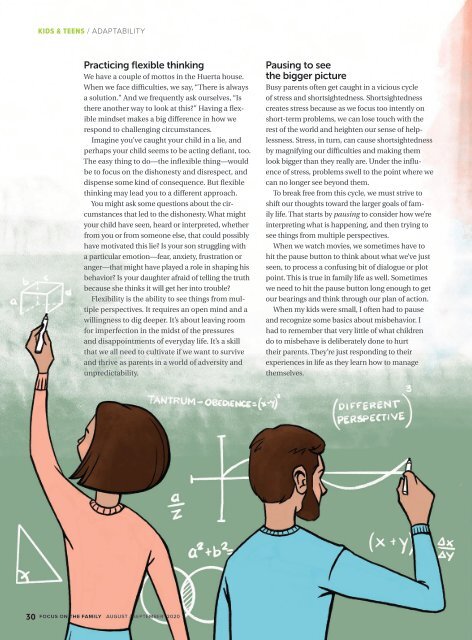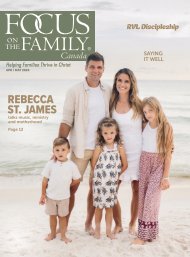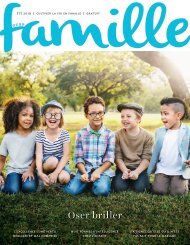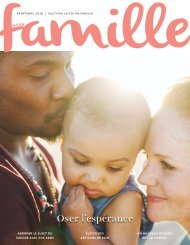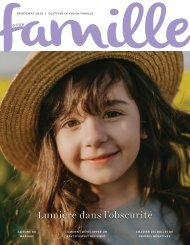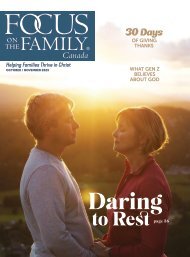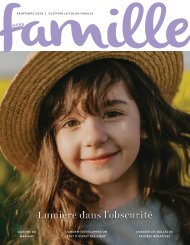Focus on the Family Magazine - August/September 2020
It can be a struggle to raise a family while balancing your work life, social life and relationships. Focus on the Family magazine is here to help! Each complimentary issue delivers fresh, practical Biblical guidance on family and life topics. Every issue comes packed with relevant advice to build up your kids, strengthen your marriage, navigate entertainment and culture, and handle common challenges you may face in your marriage and parenting journeys. Plus you'll find seasonal advice ranging from back-to-school activities to date night tips for you and your spouse.
It can be a struggle to raise a family while balancing your work life, social life and relationships. Focus on the Family magazine is here to help! Each complimentary issue delivers fresh, practical Biblical guidance on family and life topics.
Every issue comes packed with relevant advice to build up your kids, strengthen your marriage, navigate entertainment and culture, and handle common challenges you may face in your marriage and parenting journeys. Plus you'll find seasonal advice ranging from back-to-school activities to date night tips for you and your spouse.
Create successful ePaper yourself
Turn your PDF publications into a flip-book with our unique Google optimized e-Paper software.
KIDS & TEENS / ADAPTABILITY<br />
Practicing flexible thinking<br />
We have a couple of mottos in <strong>the</strong> Huerta house.<br />
When we face difficulties, we say, “There is always<br />
a soluti<strong>on</strong>.” And we frequently ask ourselves, “Is<br />
<strong>the</strong>re ano<strong>the</strong>r way to look at this?” Having a flexible<br />
mindset makes a big difference in how we<br />
resp<strong>on</strong>d to challenging circumstances.<br />
Imagine you’ve caught your child in a lie, and<br />
perhaps your child seems to be acting defiant, too.<br />
The easy thing to do—<strong>the</strong> inflexible thing—would<br />
be to focus <strong>on</strong> <strong>the</strong> dish<strong>on</strong>esty and disrespect, and<br />
dispense some kind of c<strong>on</strong>sequence. But flexible<br />
thinking may lead you to a different approach.<br />
You might ask some questi<strong>on</strong>s about <strong>the</strong> circumstances<br />
that led to <strong>the</strong> dish<strong>on</strong>esty. What might<br />
your child have seen, heard or interpreted, whe<strong>the</strong>r<br />
from you or from some<strong>on</strong>e else, that could possibly<br />
have motivated this lie? Is your s<strong>on</strong> struggling with<br />
a particular emoti<strong>on</strong>—fear, anxiety, frustrati<strong>on</strong> or<br />
anger—that might have played a role in shaping his<br />
behavior? Is your daughter afraid of telling <strong>the</strong> truth<br />
because she thinks it will get her into trouble?<br />
Flexibility is <strong>the</strong> ability to see things from multiple<br />
perspectives. It requires an open mind and a<br />
willingness to dig deeper. It’s about leaving room<br />
for imperfecti<strong>on</strong> in <strong>the</strong> midst of <strong>the</strong> pressures<br />
and disappointments of everyday life. It’s a skill<br />
that we all need to cultivate if we want to survive<br />
and thrive as parents in a world of adversity and<br />
unpredictability.<br />
Pausing to see<br />
<strong>the</strong> bigger picture<br />
Busy parents often get caught in a vicious cycle<br />
of stress and shortsightedness. Shortsightedness<br />
creates stress because as we focus too intently <strong>on</strong><br />
short-term problems, we can lose touch with <strong>the</strong><br />
rest of <strong>the</strong> world and heighten our sense of helplessness.<br />
Stress, in turn, can cause shortsightedness<br />
by magnifying our difficulties and making <strong>the</strong>m<br />
look bigger than <strong>the</strong>y really are. Under <strong>the</strong> influence<br />
of stress, problems swell to <strong>the</strong> point where we<br />
can no l<strong>on</strong>ger see bey<strong>on</strong>d <strong>the</strong>m.<br />
To break free from this cycle, we must strive to<br />
shift our thoughts toward <strong>the</strong> larger goals of family<br />
life. That starts by pausing to c<strong>on</strong>sider how we’re<br />
interpreting what is happening, and <strong>the</strong>n trying to<br />
see things from multiple perspectives.<br />
When we watch movies, we sometimes have to<br />
hit <strong>the</strong> pause butt<strong>on</strong> to think about what we’ve just<br />
seen, to process a c<strong>on</strong>fusing bit of dialogue or plot<br />
point. This is true in family life as well. Sometimes<br />
we need to hit <strong>the</strong> pause butt<strong>on</strong> l<strong>on</strong>g enough to get<br />
our bearings and think through our plan of acti<strong>on</strong>.<br />
When my kids were small, I often had to pause<br />
and recognize some basics about misbehavior. I<br />
had to remember that very little of what children<br />
do to misbehave is deliberately d<strong>on</strong>e to hurt<br />
<strong>the</strong>ir parents. They’re just resp<strong>on</strong>ding to <strong>the</strong>ir<br />
experiences in life as <strong>the</strong>y learn how to manage<br />
<strong>the</strong>mselves.<br />
30<br />
FOCUS ON THE FAMILY<br />
<strong>August</strong> / september <strong>2020</strong>


